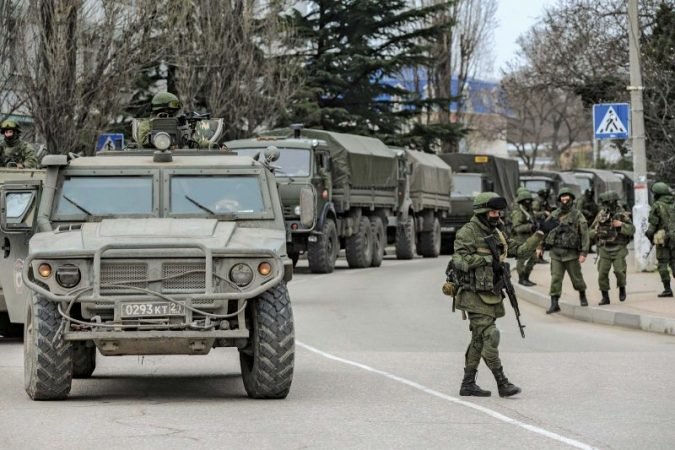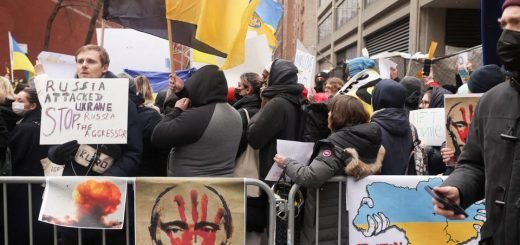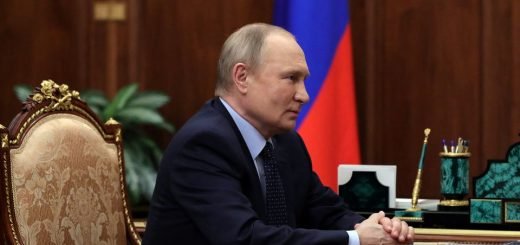Post-Annexation Crimea: Deteriorating Conditions

Crimea is a peninsula located south of Ukraine between the Black Sea and the Sea of Azov. From February to March 2014, Russia shocked the world when it annexed the Crimean Peninsula from Ukraine. The events that led up to the annexation started with Ukraine’s President Viktor Yanukovych being removed from power as a result of violent protests in Kyiv. In the following days “little green men” began taking control of key facilities on the Crimean Peninsula. At the time, the Russian government denied having any involvement with these armed men, however, Russian President Vladimir Putin later confirmed that these were indeed Russian soldiers.

On 16 March 2014, a referendum took place whereby Crimean’s were given two options: become part of the Russian Federation or return to Crimea’s 1992 constitution, which gave the peninsula more autonomy. There was no option that allowed Crimea to remain part of Ukraine under the current constitution. According to the results of the referendum, there was a turnout of 83% with 96.7 percent voting to join Russia. On March 18, Crimean and Russian officials signed a “treaty of accession”, finalizing the annexation. As a result of this annexation, Putin’s public popularity grew from around 60 percent to 90 percent. This referendum, however, was not a fair referendum as there were no international observers present. Further, it was later revealed through a leaked report that the turnout was placed at 30 percent, with only around half of them voting to join the Russian federation.
Russia legitimized the annexation due to Moscow having a historical claim to Crimea. Crimea was a part of the Soviet Union until 1954 when it was transferred to Ukraine by Soviet leader Nikita Khrushchev to strengthen the “brotherly ties between the Ukrainian and Russian peoples.” Since the collapse of the Soviet Union, however, many Russians hoped for the return of Crimea. Additionally, Crimea has an ethnic Russian majority of around 60 percent. Putin, therefore, stated that he had to protect ethnic Russians from the far-right extremists whom Russia said had overthrown Yanukovych. As a result, President Putin classifies the seizure of Crimea as being an act of self-determination rather than an illegal annexation. By seizing Crimea, Russia has a critical foothold on the Black Sea and can thus project more power into the Mediterranean, Middle East, and North Africa.

Russia’s annexation of Crimea is considered as a defining moment for global security, as it a violation of international law as well as being the first time that a European country has annexed the territory of another since the Hitler and Stalin era. Russia’s actions violated the territorial integrity and sovereignty of Ukraine as well as a number of treaties including the UN Charter, the 1994 Budapest Memorandum of Security Assurances for Ukraine and the 1997 Treaty on Friendship, Cooperation and Partnership between Ukraine and Russia.
Conditions in Post-Annexation Crimea
Since the illegal annexation of Crimea, the human rights situation has severely deteriorated, with Russian authorities creating an environment of fear and hostility. As stated in a report by the United Nations, Russia is committing “grave human rights violations” in Crimea. Furthermore, according to Ukraine’s Foreign Affairs Minister, Vadym Prystaiko, “the occupied areas have become a territory of fear and terror.”
Such human rights abuses include ill arrests, ill-treatment, enforced disappearances, torture and intimidation and the denial of basic human rights. Further, there have been intrusive law enforcement raids of private properties. Since 2014, the annexation has left 14,000 people dead and over 27,000 wounded, while 2 million residents of Crimea and Donbas have fled their homes and 3.4 million who remain are in need of humanitarian assistance.

Those who have suffered the most are indigenous Tatars, Ukrainians and various other ethnic and religious minorities. Human Rights Watch reported that self-defence units and paramilitary forces in Crimea are abducting, attacking and harassing pro-Ukrainian activists and journalists. Further, many media outlets have been shut down which have had a disproportionate effect on the Crimean Tatar and Ukrainian communities, as it is restricting their right to information and to maintain their identity. According to Ben Emmerson, a Ukrainian representative at the European court of human rights, “Russian citizenship was imposed on all residents of Crimea. Non-Russian media outlets, including Ukrainian and Tartar television channels, were closed down. Peaceful protests against the Russian occupation were banned. Vast swatches of private property were unlawfully appropriated without compensation.”
The International Response
The international community was very quick to condemn Russia’s actions. On March 27 2014, the United Nations General Assembly adopted Resolution No. 68/262, in support of Ukraine’s sovereignty, political integrity, unity and territorial integrity, condemning Russia’s annexation as illegal. The resolution was backed by 100 member states and opposed by 11. The assembly adopted a resolution titled “territorial integrity of Ukraine”, which calls on states, international organizations and specialized agencies to not recognize Crimea as a part of Russia and to refrain from any actions that could be interpreted as such.
This resolution has been followed by a wide range of other resolutions from regional actors such as the EU, OSCE, and Council of Europe. In a joint statement, the EU leaders criticized the annexation and called for Russia to withdraw its armed forces. Further, on 24 March 2014, Russia’s G8 membership was suspended and the planned G8 summit that was to be held in June that year in Sochi was cancelled. The European Union and the United States have also imposed a number of visa and financial sanctions upon Russia aimed at targeting Russia’s economy, as well as banning their ships and aircraft from travelling to Crimea without the permission of Ukraine.
Since Donald Trump became president of the United States, however, the US has adopted a softer stance on Russia compared to the previous Obama administration. President Trump, for instance, has repeatedly stated that Russia should return to the G7, despite other G7 members being against this. At a G7 summit held in 2018, he stated that it “would be an asset to have Russia back in.” President Trump has planned to invite Russian President Vladimir Putin to the summit held this year.
Moreover, Normandy talks were held last year, however, the US was not present for these talks. Rather, the leaders of France, Germany, Russia and Ukraine met in Paris with the aim of ending the armed conflict in eastern Ukraine. Holding the meeting was viewed to be a huge achievement since top-level gatherings of this sort had not taken place since 2016. The result of the summit was a new ceasefire and prisoner exchange between Ukraine and Russia. Unfortunately, there are no hopes of ending the war in eastern Ukraine and there were many disagreements between Ukraine and Russia that also emerged during the meeting.

Conclusion
To sum up, Russia’s annexation of Crimea in March 2014 sparked significant concern for the security of the rest of the international community, due to Ukraine’s territorial sovereignty being violated. The assumption that Europe had become a strategically stable continent was debunked. Since the illegal annexation, the human rights condition in Crimea has deteriorated considerably. Whilst the international community has taken steps to try and resolve the situation in Crimea and Ukraine, more must be done to improve the situation for the lives of many.


















